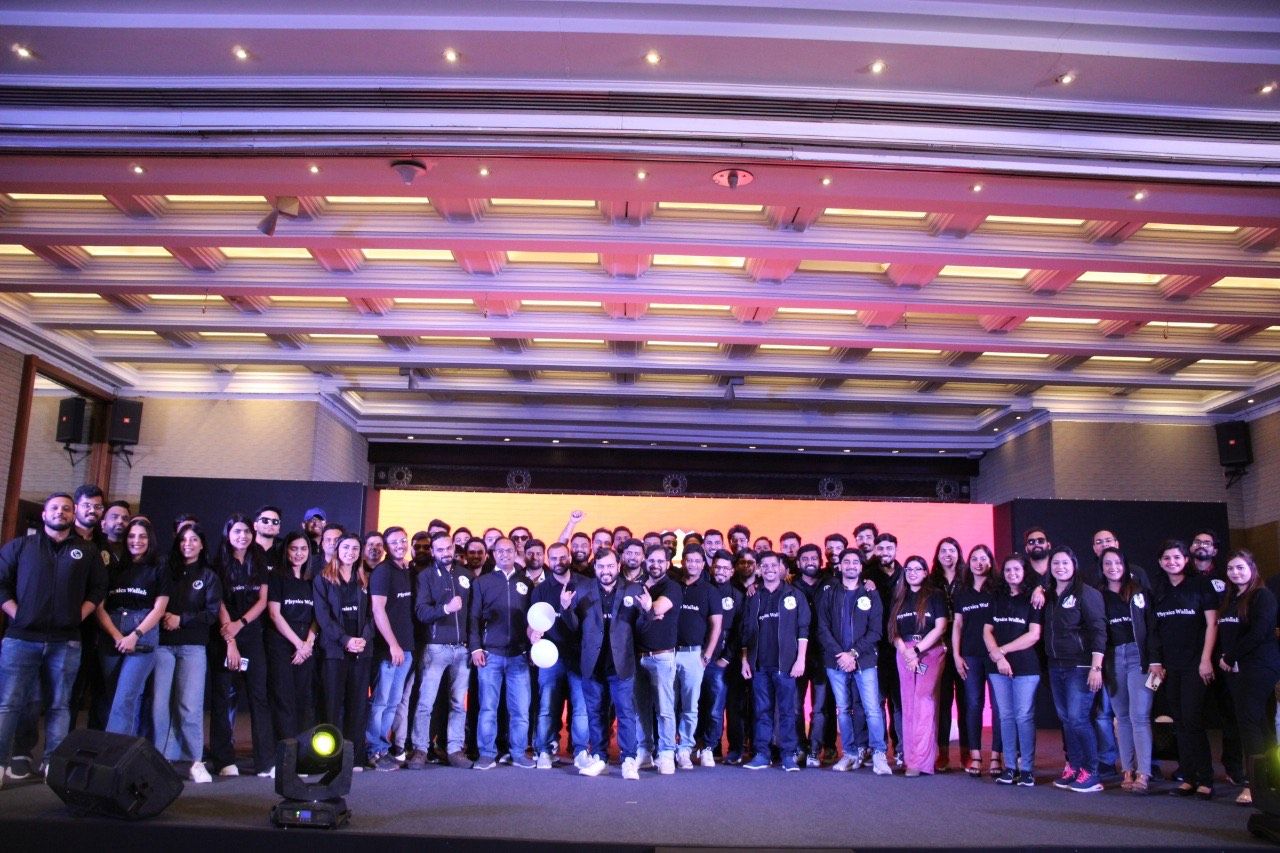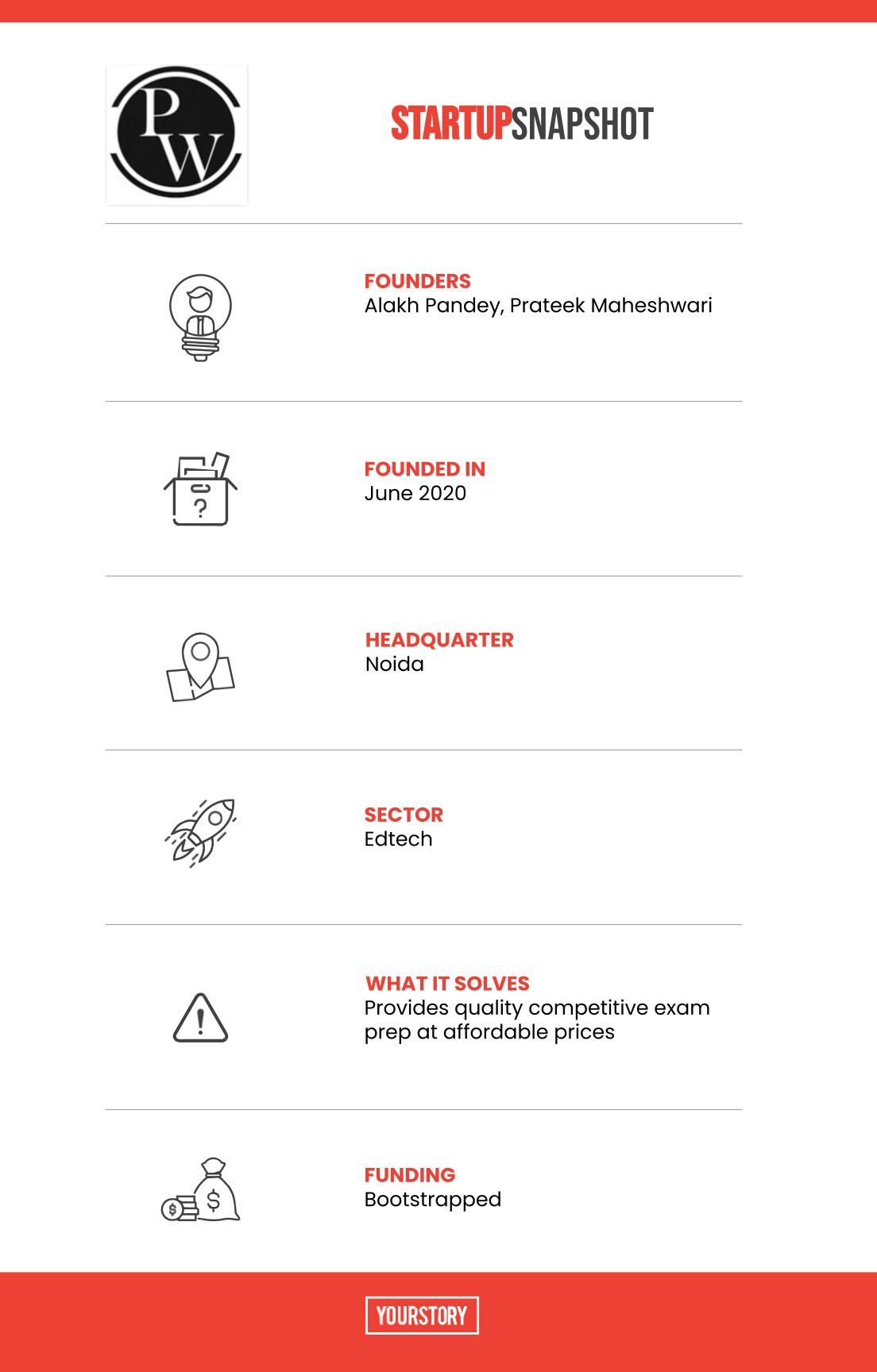Alakh Pandey loved to learn as a child, but his humble background did not let him fulfil his dream – an IIT degree.
Born and raised in Allahabad, the young boy went on to study mechanical engineering from Harcourt Butler Technical University, Kanpur. But, aware that his family had sold their home to fund his education, Alakh was keen to do his bit and used to teach JEE/NEET courses at offline coaching centres during his graduation.
In the know of the many problems students face and keen to make a difference, Alakh in 2016 started a YouTube channel offering physics and chemistry lectures for JEE/NEET examinations for free.
In 2019, he was joined by Prateek Maheshwari, CEO of Pen Pencil, an edtech SaaS service provider.
“After a few meetings, I realised Prateek and I shared great synergies and asked him to become a co-founder,” Alakh says.
Prateek was the tech guy who helped Alakh launch the PW app in May 2020. There were so many downloads that the app crashed on Day 1; there were three lakh downloads in seven days.
Today, PhysicsWallah is a family of more than six million students and 1,500 staff, who aim to provide quality educational content at affordable prices. It has launched an app, runs online and offline classes, and is eyeing unicorn status.
In the beginning
Alakh says his father was skeptical when he told him about his plans to launch a channel while his mother supported him whole-heartedly.
PhysicsWallah was born as a YouTube channel in 2016 with an investment of about Rs 30,000. With a camera phone, tripod, whiteboard, and a few books, Alakh got down to the business of making videos.
The channel garnered a subscriber base of 10,000 in the first year.

Team PhysicsWallah
He began by making lectures on topics in physics and chemistry (except inorganic). However, he realised that he alone would not be able to provide complete curriculum for competitive examinations, give assignments, and conduct tests.
Despite these problems, his channel crossed 50,000 subscribers in 2017 and he decided to launch an app that would provide complete curriculum for JEE/NEET examinations.
“It took us around two and a half years to actually launch the platform, and Prateek, who came with a very good tech idea and the business model, helped us launch our Android version, PW, in May 2020.”
The proprietary PW app was developed by the inhouse tech team under Prateek’s supervision, using the React Native Tech Stack.
“It is a very student-friendly app. More than 5.5 lakh students consume 90 minutes of educational content every day. The overall rating of the app on Google Play Store is 4.8. Moreover, the PW app is probably the only one to conduct the largest live online class,” Prateek claims.
The startup course structure for NEET and JEE aspirants is divided into two categories - live classes and scheduled recorded lectures. These are further sub-divided into free (on YouTube) and paid batches (on app).
In the paid batches, students can access daily practice problems, one-to-one mentorship by JEE and NEET students, and live doubt sessions by top faculties, including PW Founder Alakh Pandey.

YS Design Team
The YouTube channel allows any aspirant to watch the videos on Competition Wallah, JEE Wallah, Physics Wallah Foundation, NCERT Wallah, Defence Wallah - NDA, Physics Wallah - English, PW - UP Bihar.
“The biggest series that we are currently running for free on YouTube is Manzil 2.0 (free online batch for JEE preparation with study material on the app). We recently launched our Neev, Udaan, Arjuna, and Lakshya batches on the app, targeting Classes 9,10, 11 and 12 students, respectively,” Alakh adds.
Alakh invested about Rs 15 lakh on the app development, earned as ad revenue from his YouTube channel.
In June 2020, the duo registered the company under the name Physics Wallah Private Limited.
Alakh says COVID-19 acted as a catalyst for adoption.
“Our students were looking forward to continuing their competition exam preparation. With all offline centres going under lockdown and no solution to online studies at affordable prices, we decided to launch the app soon,” he says.
When PW launched its first course, Lakshya (physics for JEE), at an affordable price of just Rs 999, it got a massive response from students across India.
About 70,000 students signed up for the six-month course and helped PW generate massive revenue. In 2021, the PW app witnessed 2.1 million signups.
Apart from YouTube and the app, the edtech startup also runs 20 offline centres known as PW Pathshala in 18 cities. This arm was started in October 2021 with an initial investment of around Rs 2 crore. These centres charge Rs 30,000-Rs 35,000 for one-year JEE or NEET courses.
Currently they have 400 employees across all centres and had 6,500 students in the last academic year.
PW Pathshala centres are in Prayagraj, Bhagalpur, Bhopal, Delhi, Dhanbad, Gomti Nagar, Gorakhpur, Indore, Jaipur, Kanpur, Kolkata, Lucknow, Kapoorthala, Malda, Noida, Patna-Boring Road, Patna-Kankarbagh, Pune, and Ranchi.
However, Alakh says the main focus is the online business - the app.
“As we want our courses to be affordable for our students, online is the only way. Offline centres includes operational costs. And, we want to make education more affordable.”
Without disclosing revenue figures, the founder says the app generates 95 percent of the business..
“We have reached more than 10 million students on YouTube and four million+ students have downloaded the PW app. More than 500,000 students consume 1.5 hours of content on the app every day,” Alakh says.
The company now has a 1,500-member team.
Alakh, the CEO, takes care of academics and branding, while Prateek handles product and technological advancements.
“We are team of young brainstormers, divided into different departments. We have 300 people in academics, 75 in tech, 700 in operations, 250 in marketing and counselling, and the rest in HR and miscellaneous,” Alakh says.
The USP and the market
The edtech startup aims to make quality education accessible to every student at an affordable price.
Alakh says, “Money should not be a challenge for students who aspire to achieve their dreams. We are building technology for students. PW is not a company, but an emotion. Anything that damages that, even a business idea, we just immediately stop. We are very, very sensitive towards students' sentiments.”
Edtech startups like Vedantu, BYJU’S, and Unacademy are competing in the same space. But PW stands out because of its price point, offering premium courses at Rs 1,000 to Rs 4,500 per year.
According to a research report by Technavio, the test preparation market in India was projected to have a year-on-year growth rate of 13.25 percent in 2021 along with a CAGR of 14 percent between 2020 and 2025.
Alakh believes the startup is well poised to benefit from the demand.
Funding and the way ahead
PhysicsWallah is in late-stage talks with a couple of impactful investors to raise funds.
“We are in talks to raise $100 million with Westbridge, GSV Ventures, and a couple of other investors. PhysicsWallah will be valued at anywhere near $1 billion and if nothing goes wrong, the deal is [expected] to be announced in a few weeks,” Alakh says.
The founder says the startup is planning to expand in categories like K-10, and open several more PW Pathshalas across India.
“By the end of this year, we plan to offer several other courses in Bengali, Marathi, Telugu, Tamil, Gujarati, Odia, Malayalam, and Punjabi to extend our reach across all corners of the country,” Alakh says.
Edited by Teja Lele Desai



